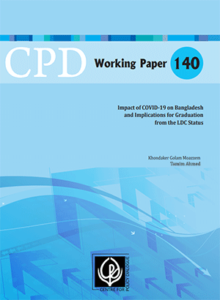 CPD Working Paper 140
CPD Working Paper 140
Impact of COVID-19 on Bangladesh and Implications for Graduation from the LDC Status
The Working Paper 140 aims to understand the human, economic and social hazards endured by Bangladesh due to COVID-19, and measure the country’s resilience and the potential impacts of COVID on the graduation of Bangladesh from the least developed country (LDC) status. The profile also highlights the important external shocks facing Bangladesh and assesses the extent to which these shocks are hindering its development. Even in this critical backdrop, Bangladesh has qualified for LDC graduation in 2021. However, if the pandemic takes a turn for the worse, Bangladesh might face unprecedented challenges in both post-COVID and post-graduation period. This is reflected in the weakening of performance on various macroeconomic indicators at varying degrees, including a slow rise in gross national income (GNI) per capita as well as in industrial production and services, rise in inflation, drop in remittances, a shortfall in revenue generation, slow-down of public expenditure, rise in fiscal deficit, and reduction in national savings and gross domestic investment including foreign direct investment (FDI). However, a positive development is observed in case of rice production and spending on social protection. On the other hand, the pandemic has led to a serious rise in income inequality. Also, it has adversely impacted indicators of human asset index. Moreover, the COVID outbreak has posed a threat to food security and nutrition which would limit the progress that Bangladesh has recently made in terms of nutrition status. In the worst-case scenario, COVID has increased the child mortality rate, posing a challenge to Bangladesh’s recent progress made in this regard. Besides, maternal and new-born health services—due to the unavailability of midwives and worries of COVID infection—have been hampered and resulted in the increase in maternal mortality rate. Furthermore, the closure of schools for an extended period due to COVID would hamper the progress in case of adult literacy rate including secondary school enrolment, and would increase dropouts, early marriage and child labour. On top of that, being a disaster-prone country and subject to sea-level rise, Bangladesh is susceptible to frequent natural disasters and climate change particularly during COVID. Although the country gradually did well in tackling natural disaster-induced damages, the adverse impact of climate change could affect the lives of 8.9 per cent of the population living in low-lying coastal areas. Export of Bangladesh, also, remains highly vulnerable due to overdependence on the readymade garment (RMG) industry. With a fall in RMG export, Bangladesh’s total export substantially declined in view of COVID-19. Under these circumstances, it is apprehended that there is increasing risk concerning structural transformation and smooth LDC graduation. Thus, this study sheds light on manifold impacts of COVID-19. Considering the implications, the study suggests that the international support measures (ISMs) (applicable for LDCs) need to continue for the graduating LDCs including Bangladesh for an extended period to allow time for preparedness without major ISMs after graduation. Besides, an extension of existing benefits for graduating from the LDC category at bilateral and multilateral levels at least until 2030 could be considered targeting attainment of the Sustainable Development Goals (SDGs).
Authors: Dr Khondaker Golam Moazzem and Tamim Ahmed
Publication Period: December 2021



